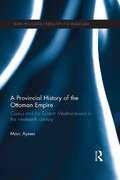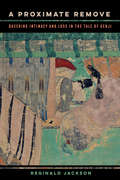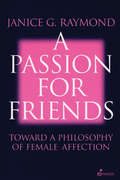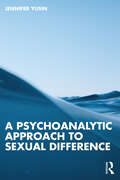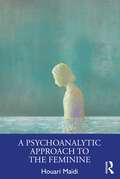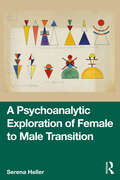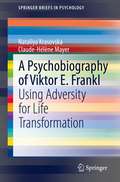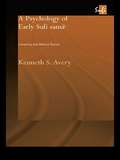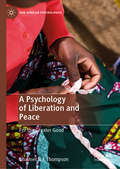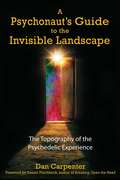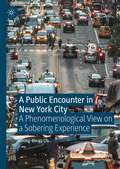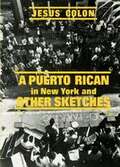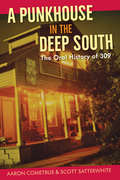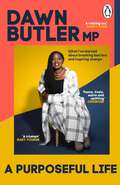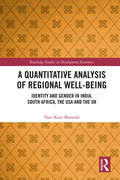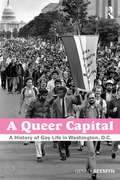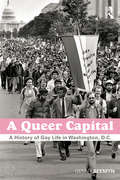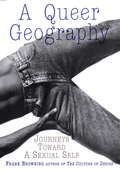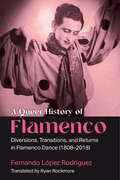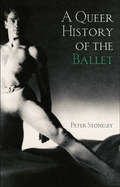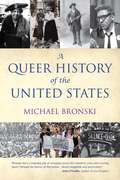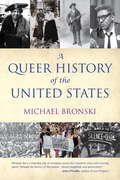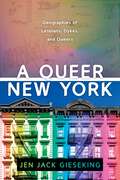- Table View
- List View
A Provincial History of the Ottoman Empire: Cyprus and the Eastern Mediterranean in the Nineteenth Century (SOAS/Routledge Studies on the Middle East)
by Marc AymesProvincializing the history of the Ottoman Empire, this book provides a critical approach to the projects of ‘modernity’ that took place in the Eastern Mediterranean over the past two centuries. Leaving their mark on this period are; the turmoil of insurgency in Greece and Egypt, a growing intervention of European Powers in Eastern Mediterranean politics, and the unfolding of large reform projects within the administration of the Ottoman Empire. Whilst these developments have prompted enduring debates over Middle Eastern paths of transformation, the case of Cyprus has remained isolated from these discussions, something this book seeks to address. One of the first research monographs to appear in English on Cyprus during the eventful times of the Ottoman ‘long’ 19th century, this book consistently seeks to provide a dialogue between source analyses and theoretical frameworks. Exploring the myriad relationships between this singular locality and the regional – not to say global – dynamics of empire, trade and social change at that time, A Provincial History of the Ottoman Empire will be of interest to students and scholars with an interest in the Middle East and Modern History.
A Proximate Remove: Queering Intimacy and Loss in The Tale of Genji (New Interventions in Japanese Studies #2)
by Reginald JacksonA free ebook version of this title is available through Luminos, University of California Press's Open Access publishing program. Visit www.luminosoa.org to learn more. How might queer theory transform our interpretations of medieval Japanese literature and how might this literature reorient the assumptions, priorities, and critical practices of queer theory? Through a close reading of The Tale of Genji, an eleventh-century text that depicts the lifestyles of aristocrats during the Heian period, A Proximate Remove explores this question by mapping the destabilizing aesthetic, affective, and phenomenological dimensions of experiencing intimacy and loss. The spatiotemporal fissures Reginald Jackson calls "proximate removes" suspend belief in prevailing structures. Beyond issues of sexuality, Genji queers in its reluctance to romanticize or reproduce a flawed social order. An understanding of this hesitation enhances how we engage with premodern texts and how we question contemporary disciplinary stances.
A Pssion for Friends
by Janice RaymondThis feminist classic explores the many manifestations of friendship between women and examines the ways women have created their own communities and destinies through friendship.
A Psychoanalytic Approach to Sexual Difference
by Jennifer YusinA Psychoanalytic Approach to Sexual Difference analyzes the concepts of sex and gender, showing how sexual difference is characterized by ongoing transformations of spatiality and body, and of essentiality and normativity. In this book, Jennifer Yusin presents a psychoanalytic study that engages with clinical cases, philosophies of sex and gender, and psychoanalytic writings about sexual difference. She deftly and accessibly analyzes Freud’s and Lacan’s work on feminine sexuality, Winnicott’s notion of the transitional object, and theories of sexuality and gender developed by Judith Butler and Monique Wittig, among others. Yusin starts with the question of how the lack of any essential definition of sexual difference affects subjectivity. She places an emphasis on the psychoanalytic experience and its effects upon how a subject experiences the difference between being a body and having a body. Following Lacan’s discovery of the Borromean knot structure of the unconscious and the work of the psychoanalyst Jean-Gérard Bursztein, Yusin continues developing subjective topology as a methodology. She also introduces and shows how sexual difference is linked to transformations of sex and body. Through this, Yusin highlights how it is necessary to reformulate sex, gender, and sexual identities in psychoanalytic theories and in the practice of psychoanalysis. She also speaks to the necessity of generating a new lexicon to help analysts speak about sexual difference in ways that do not perpetuate any essentialism or normativity on the topic. This book is essential reading for clinicians in psychoanalysis, mental health practitioners in the trans field, and academics working in gender theory, queer and trans studies, and feminist philosophies.
A Psychoanalytic Approach to Sexual Difference
by Jennifer Yusin1. This book presents an original analysis of sexual difference, emphasising the psychoanalytic experience and its effects upon how a subject experiences the difference between being a body and having a body; 2. Yusin elucidates this potentially muddied (?) area with an approachable writing style, highlighting the tools contemporary analysts need to advance their own notions of sex and gender, as well as how to update their lexicon and approach to the topic; 3. Throughout, Yusin draws on the psychoanalytic theories of Freud, Lacan and Winnicott, as well as theories of sexuality and gender developed by Michel Foucault, Judith Butler and Jack Halberstam;
A Psychoanalytic Approach to the Feminine
by Houari MaïdiA Psychoanalytic Approach to the Feminine sees Houari Maïdi dissect the concepts and characteristics of the feminine in both males and females, separating them from womanhood and femininity, and equipping readers with the tools to better understand pathologies such as masochism, narcissism, depression, and paranoia.Starting from Freud’s binary depiction of gender identity through the lens of bisexuality, Maïdi seeks to redress the way in which traditional psychoanalysis considers sexual characteristics. He separates the feminine from gender, showing how historically misogynistic theories in psychoanalysis have potentially damaged the progress of the field, as well as female and male analysands alike. Depictions of the feminine are considered through their relationship with traumatic seduction, mourning and melancholy to address questions related to different clinical and psychopathological representations.Using clinical vignettes throughout, this book is essential reading for psychoanalysts and those interested in the intersection between gender and analysis.
A Psychoanalytic Exploration of Female to Male Transition
by Serena HellerDrawing on theory from a range of schools of psychoanalytic thought, this timely book addresses and explores the phenomenon of the increasing number of people who were assigned female at birth and now identify as male, and what might underly the cultural pull to remove femaleness from self and body.In A Psychoanalytic Exploration of Female to Male Transition, Serena Heller considers how early recognition of the difference between the sexes might evoke a melancholic attitude towards one’s anatomy, as being one sex and not the other. She considers the ramifications of the developing sexual bodies of young women at a time when they are having great difficulty accepting them, addressing the complexity of female sexual development in relation to sexual aim and object, and how manifestations of early bisexuality can resurface during puberty. Focusing solely on the experience of female-to-male transition, rather than making broad assumptions of a universal trans experience, Heller provides a depth of theoretical analysis of biological and psychic aspects of female sexuality, and trans gender identifications.Empathetic in its approach and thorough in its conceptualisation, this volume is a vital resource for psychodynamic and psychoanalytic psychotherapists working directly with trans patients, and with those experiencing gender dysphoria and issues of sexual identity. The book assumes no prior expertise in analytic thought, and is designed to help mental health practitioners, students and researchers engaged in queer studies, gender studies and the intersection of psychoanalytic thought and gender identity.
A Psychobiography of Viktor E. Frankl: Using Adversity for Life Transformation (SpringerBriefs in Psychology)
by Claude-Hélène Mayer Nataliya KrasovskaThis book is a psychobiography on the life of Viktor Frankl and a unique exploration of his life from a positive psychology perspective. It uses Paul Wong’s theory of positive psychology wave 2 (PP2.0) and explores the concepts of meaning and virtue throughout Frankl's life span. The authors define virtue in terms of appreciation of beauty, gratitude, hope, humour and spirituality, and define meaning based on Paul Wong’s PURE model. They apply Irving Alexander’s primary indicators of psychological salience and W.T. Schultz’s prototypical scenes to analyse Frankl's important life events. This psychobiography presents an original contribution to theory on three levels: advancing the literature in psychobiography, developing the field of PP2.0, and providing new insights into Frankl’s life. It is a must for psychographers, positive psychologists and people interested in Frankl’s life and theoretical contributions.
A Psychology of Early Sufi Samâ`: Listening and Altered States (Routledge Sufi Series)
by Kenneth S. AveryAvery explores the psychology of altered states among the early Sufis. It examines samâ` - listening to ritual recitation, music and certain other aural phenomena - and its effect in inducing unusual states of consciousness and behaviours. The focus is on the earliest personalities of the Islamic mystical tradition, as mediated by texts from the tenth to the twelfth centuries C.E. These unusual states are interpreted in the light of current research in Western psychology, and also in terms of their integration into historical Islamic culture. A Psychology of Early Sufi Samâ` provides new insights into the work of five Sufi authors, and a fresh approach to the relation between historical accounts of altered states and current psychological thinking.
A Psychology of Liberation and Peace: For the Greater Good (Pan-African Psychologies)
by Chalmer E. ThompsonThis book addresses the need to radically transform societies plagued by racism. It places prominence on persistent racialized violence in the lives of Black Americans as influential in how Black people in the U.S. and abroad perceive themselves as Black in juxtaposition to their perceptions of White people and other People of Color. An absence of understanding of the often-masked role of violence in the lives of Black people increases the likelihood of reproducing it. The author offers a reformulation of racial identity theory to examine the construction of Manichaeism in people and societies, and how meaningful engagement that confronts the violence is vital to psychological development, though this engagement also is not without dire risks.
A Psychonaut's Guide to the Invisible Landscape: The Topography of the Psychedelic Experience
by Daniel Pinchbeck Dan CarpenterA bold cartography of the inner landscape visible only to those experiencing altered states• Presents the psychedelic experience as an objective landscape that embodies the Other, rather than a subjective state of mind• Provides corroboration of phenomena encountered by those who venture into this domainJourneying into the invisible world revealed by his use of the dissociative psychedelic DXM (dextromethorphan), Dan Carpenter found that what he experienced was not simply subjective sensations and psychological states but an objective world of familiar, if inordinately odd, landmarks and characters. The running diary he kept of these voyages recounts impressions of a landscape charted by other travelers into this Inner Space and includes descriptions of many of the same phenomena recorded by such mind travelers as Terence and Dennis McKenna, Alexander and Ann Shulgin, and others who have experienced the hive mind--the pool of all consciousness. Into this territory where expression is like chaos theory, where oddly symmetrical order manifests out of the seemingly anarchic swirl of images and events, the author ventures with the mind-set of a naturalist, accepting whatever might be rather than what he hopes he might find. What emerges is not a location crafted by subjective experience, but a landscape that embodies the Other and that represents a conscious state in which the barriers between the self and the not-self dissolve.
A Public Encounter in New York City: A Phenomenological View on a Sobering Experience
by Joong-Hwan OhThis book examines the essence of a particular personal experience within a New York City public space. The principal approach, both theoretical and methodological, is the phenomenological perspective, an in-depth study of such a surprising experience in the real world from the first-person point of view. The book introduces a new concept of “the situated self,” that is, the whole entity of the respondent’s subjective world about his or her particular urban experience in public. It is one’s “being-in-the-word” or lived experience in the real world. Another important feature of “the situated self” is its comprehensive constitution of all certain human traits, perceptions, emotions, bodily sensations, cognition, and behavioral reaction, and their close situational connectivity to one another. By implication, this public experience of “the situated self” is a common denominator shared among regular users of New York City public spaces for making their city life with urban strangers more routinized, predictable, tolerant, and civic.
A Puerto Rican in New York and Other Sketches
by Jesús Colón Juan FloresWarm, often humorous, thoughtful true-to-life socio-political vignettes by the late journalist and barrio-laureate.
A Punkhouse in the Deep South: The Oral History of 309
by Aaron Cometbus Scott SatterwhiteRadical subcultures in an unlikely place Told in personal interviews, this is the collective story of a punk community in an unlikely town and region, a hub of radical counterculture that drew artists and musicians from throughout the conservative South and earned national renown. The house at 309 6th Avenue has long been a crossroads for punk rock, activism, veganism, and queer culture in Pensacola, a quiet Gulf Coast city at the border of Florida and Alabama. In this book, residents of 309 narrate the colorful and often comical details of communal life in the crowded and dilapidated house over its 30-year existence. Terry Johnson, Ryan “Rymodee” Modee, Gloria Diaz, Skott Cowgill, and others tell of playing in bands including This Bike Is a Pipe Bomb, operating local businesses such as End of the Line Cafe, forming feminist support groups, and creating zines and art. Each voice adds to the picture of a lively community that worked together to provide for their own needs while making a positive, lasting impact on their surrounding area. Together, these participants show that punk is more than music and teenage rebellion. It is about alternatives to standard narratives of living, acceptance for the marginalized in a rapidly changing world, and building a sense of family from the ground up. Including photos by Cynthia Connolly and Mike Brodie, A Punkhouse in the Deep South illuminates many individual lives and creative endeavors that found a home and thrived in one of the oldest continuously inhabited punkhouses in the United States.
A Purposeful Life: What I’ve Learned About Breaking Barriers and Inspiring Change
by Dawn Butler'Dawn Butler is a history-making, game-changing, ceiling-smashing politician.This powerful book offers a fascinating insight into both the personal and political sides of her journey.'Sadiq Khan, Mayor of London'When I was younger my parents taught me to be resilient and my brothers told me to be resistant, and now I think it's time for a revolution. Let's complete the power of three.'The third Black woman ever to be elected as an MP, Dawn Butler is a pioneer who speaks truth to power. Famously ejected from the House of Commons for calling Boris Johnson a liar, Dawn’s sense of purpose has carried her over countless hurdles to help her stand up for what is right and influence transformation, from the Met Police to the NHS.Now, for the first time she recalls the pivotal moments in her life, to give others the courage and conviction to dream big and improve the world around them. Revealing how traditional routes to success and power are outdated, Dawn’s story shows that by celebrating the strength of diverse communities, looking at an issue from all angles and embracing intersectionality, it’s easier than we think to disrupt a broken system.This uplifting and hopeful read shows how anybody can make positive change, even when the world around us feels fractured beyond repair.
A Quantitative Analysis of Regional Well-Being: Identity and Gender in India, South Africa, the USA and the UK (Routledge Studies in Development Economics)
by Vani Kant BorooahUsing data from the World Values Survey, this book sheds light on the link between happiness and the social group to which one belongs. The work is based on a rigorous statistical analysis of differences in the probability of happiness and life satisfaction between the predominant social group and subordinate groups. The cases of India and South Africa receive deep attention in dedicated chapters on cast and race, with other chapters considering issues such as cultural bias, religion, patriarchy, and gender. An additional chapter offers a global perspective. On top of this, the longitudinal nature of the data facilitates an examination of how world happiness has evolved between 1994 and 2014. This book will be a valuable reference for advanced students, scholars and policymakers involved in development economics, well-being, development geography, and sociology.
A Queer Capital: A History of Gay Life In Washington D. C.
by Genny BeemynRooted in extensive archival research and personal interviews, A Queer Capital is the first history of LGBT life in the nation's capital. Revealing a vibrant past that dates back more than 125 years, the book explores how lesbians, gay men, and bisexuals established spaces of their own before and after World War II, survived some of the harshest anti-gay campaigns in the U. S. , and organized to demand equal treatment. Telling the stories of black and white gay communities and individuals, Genny Beemyn shows how race, gender, and class shaped the construction of gay social worlds in a racially segregated city. From the turn of the twentieth century through the 1980s, Beemyn explores the experiences of gay people in Washington, showing how they created their own communities, fought for their rights, and, in the process, helped to change the country. Combining rich personal stories with keen historical analysis, A Queer Capital provides insights into LGBT life, the history of Washington, D. C. , and African American life and culture in the twentieth century.
A Queer Capital: A History of Gay Life in Washington D.C.
by Genny BeemynRooted in extensive archival research and personal interviews, A Queer Capital is the first history of LGBT life in the nation’s capital. Revealing a vibrant past that dates back more than 125 years, the book explores how lesbians, gay men, and bisexuals established spaces of their own before and after World War II, survived some of the harshest anti-gay campaigns in the U.S., and organized to demand equal treatment. Telling the stories of black and white gay communities and individuals, Genny Beemyn shows how race, gender, and class shaped the construction of gay social worlds in a racially segregated city. From the turn of the twentieth century through the 1980s, Beemyn explores the experiences of gay people in Washington, showing how they created their own communities, fought for their rights, and, in the process, helped to change the country. Combining rich personal stories with keen historical analysis, A Queer Capital provides insights into LGBT life, the history of Washington, D.C., and African American life and culture in the twentieth century.
A Queer Dharma: Yoga and Meditations for Liberation
by Jacoby BallardQueer critique, queer practice: embodied teachings for healing from trauma and social injustice.Jacoby Ballard provides an empowering and affirming guide to embodied healing through yoga and the dharma, grounded in the brilliance, resilience, and lived experiences of queer folks.Part I deconstructs the ways mainstream yoga perpetuates queer- and transphobia and other systemic oppressions, exploring the intersections of yoga, capitalism, cultural appropriation, and sexual violence. Ballard also addresses the trauma--complex, vicarious, historical, and collective--perpetuated against queer communities. In response, he offers tools for self-compassion, tonglen, lovingkindness, and grounding, and helps readers explore questions like: • What is trauma? How is it a product of injustice--and how can healing it create justice? • The world won't stop being homo- and transphobic, so how do I encounter that in a way that does the least harm? • How do we love what is uniquely trans about us? • What are affinity groups, and why do we need them?In part II, Ballard offers a queer-centered, fully embodied, and equity-rooted practice with meditations, practices, and sequences for processing and healing from trauma individually and in community. He explains concepts like lovingkindness, letting go, compassion, joy, forgiveness, and equanimity through a queer lens, and pairs each with corresponding meditations, practices, and beautiful line drawings of queer bodies.Enhanced with stories from Ballard's personal practice and professional experience teaching yoga in schools, prisons, conferences, and his weekly Queer and Trans Yoga class, A Queer Dharma is a guidebook, reclamation, and unapologetically queer heart offering for true healing and transformation.
A Queer Geography
by Frank BrowningThe Author of the best-selling The Culture of Desire journeys into the minds of gay men in America and around the world to discover how their lives - and their desires - are shaped by the time, place, and culture in which they live.
A Queer History of Flamenco: Diversions, Transitions, and Returns in Flamenco Dance (1808–2018)
by Fernando López RodríguezA Queer History of Flamenco offers a groundbreaking exploration of flamenco through the lenses of queer theory and cultural studies. Previous histories have provided a largely distorted image about why, where, and how people have done flamenco—as well as who has performed flamenco. Yet feminists, transvestites, butches, femmes, the Spanish Roma, disabled people, guiris, and “incomprehensible” artists have been determined to do things differently without giving up their flamenco status. In this skillful translation of his book Historia queer del flamenco, Fernando López Rodríguez draws on diverse archival materials as well as his own lived experience and artistic practice, unearthing queer flamenco histories, voices, and perspectives that were previously unknown, avoided, or purposely hidden. Tracing flamenco’s development from its birth up to the contemporary era, the book places flamenco within significant historical periods such as the Spanish Civil War, Franco’s dictatorship, the transition to democracy, and the economic crisis of 2008, up to contemporary performances of the late 2010s. In taking a queer approach to History, the author abandons antiquated debates about purities and impurities; anecdotes about the lives of artists that are completely detached from their processes of creation; and myths about geniuses who seem to make art alone and completely detached from their collaborators and the historical, social, economic and artistic moment in which they lived. A Queer History of Flamenco is not only about the present and the queerness of people living, performing, or creating in it, but also about flamenco’s past in which so many queer artists and practices and their lives have remained unearthed and unaddressed.
A Queer History of the Ballet
by Peter StoneleyDesigned for students, scholars and general readers with an interest in dance and queer history, A Queer History of the Ballet focuses on how, as makers and as audiences, queer men and women have helped to develop many of the texts, images, and legends of ballet. Presenting a series of historical case studies, the book explores the ways in which, from the nineteenth century into the twentieth, ballet has been a means of conjuring homosexuality – of enabling some degree of expression and visibility for people who were otherwise declared illegal and obscene. Studies include: the perverse sororities of the Romantic ballet the fairy in folklore, literature, and ballet Tchaikovsky and the making of Swan Lake Diaghilev’s Ballets Russes and the emergence of queer modernity the formation of ballet in America the queer uses of the prima ballerina Genet’s writings for and about ballet. Also including a consideration of how ballet’s queer tradition has been memorialized by such contemporary dance-makers as Neumeier, Bausch, Bourne, and Preljocaj, this is an essential book in the study of ballet and queer history.
A Queer History of the United States
by Michael BronskiThe first book to cover the entirety of lesbian, gay, bisexual, and transgender history, from pre-1492 to the present. In the 1620s, Thomas Morton broke from Plymouth Colony and founded Merrymount, which celebrated same-sex desire, atheism, and interracial marriage. Transgender evangelist Jemima Wilkinson, in the early 1800s, changed her name to "Publick Universal Friend," refused to use pronouns, fought for gender equality, and led her own congregation in upstate New York. In the mid-nineteenth century, internationally famous Shakespearean actor Charlotte Cushman led an openly lesbian life, including a well-publicized "female marriage." And in the late 1920s, Augustus Granville Dill was fired by W. E. B. Du Bois from the NAACP's magazine the Crisis after being arrested for a homosexual encounter. These are just a few moments of queer history that Michael Bronski highlights in this groundbreaking book. Intellectually dynamic and endlessly provocative, A Queer History of the United States is more than a who's who of queer history: it is a book that radically challenges how we understand American history. Drawing upon primary documents, literature, and cultural histories, noted scholar and activist Michael Bronski charts the breadth of lesbian, gay, bisexual, and transgender history, from 1492 to the 1990s, and has written a testament to how the LGBT experience has profoundly shaped our country, culture, and history. A Queer History of the United States abounds with startling examples of unknown or often ignored aspects of American history-the ineffectiveness of sodomy laws in the colonies, the prevalence of cross-dressing women soldiers in the Civil War, the impact of new technologies on LGBT life in the nineteenth century, and how rock music and popular culture were, in large part, responsible for the devastating backlash against gay rights in the late 1970s. Most striking, Bronski documents how, over centuries, various incarnations of social purity movements have consistently attempted to regulate all sexuality, including fantasies, masturbation, and queer sex. Resisting these efforts, same-sex desire flourished and helped make America what it is today. At heart, A Queer History of the United States is simply about American history. It is a book that will matter both to LGBT people and heterosexuals. This engrossing and revelatory history will make readers appreciate just how queer America really is.
A Queer History of the United States (ReVisioning American History #1)
by Michael BronskiWinner of a 2012 Stonewall Book Award in nonfictionThe first book to cover the entirety of lesbian, gay, bisexual, and transgender history, from pre-1492 to the present.In the 1620s, Thomas Morton broke from Plymouth Colony and founded Merrymount, which celebrated same-sex desire, atheism, and interracial marriage. Transgender evangelist Jemima Wilkinson, in the early 1800s, changed her name to “Publick Universal Friend,” refused to use pronouns, fought for gender equality, and led her own congregation in upstate New York. In the mid-nineteenth century, internationally famous Shakespearean actor Charlotte Cushman led an openly lesbian life, including a well-publicized “female marriage.” And in the late 1920s, Augustus Granville Dill was fired by W. E. B. Du Bois from the NAACP’s magazine the Crisis after being arrested for a homosexual encounter. These are just a few moments of queer history that Michael Bronski highlights in this groundbreaking book. Intellectually dynamic and endlessly provocative, A Queer History of the United States is more than a “who’s who” of queer history: it is a book that radically challenges how we understand American history. Drawing upon primary documents, literature, and cultural histories, noted scholar and activist Michael Bronski charts the breadth of lesbian, gay, bisexual, and transgender history, from 1492 to the 1990s, and has written a testament to how the LGBT experience has profoundly shaped our country, culture, and history. A Queer History of the United States abounds with startling examples of unknown or often ignored aspects of American history—the ineffectiveness of sodomy laws in the colonies, the prevalence of cross-dressing women soldiers in the Civil War, the impact of new technologies on LGBT life in the nineteenth century, and how rock music and popular culture were, in large part, responsible for the devastating backlash against gay rights in the late 1970s. Most striking, Bronski documents how, over centuries, various incarnations of social purity movements have consistently attempted to regulate all sexuality, including fantasies, masturbation, and queer sex. Resisting these efforts, same-sex desire flourished and helped make America what it is today. At heart, A Queer History of the United States is simply about American history. It is a book that will matter both to LGBT people and heterosexuals. This engrossing and revelatory history will make readers appreciate just how queer America really is. From the Hardcover edition.
A Queer New York: Geographies of Lesbians, Dykes, and Queers
by Jen Jack GiesekingWinner, 2021 Glenda Laws Award given by the American Association of GeographersThe first lesbian and queer historical geography of New York CityOver the past few decades, rapid gentrification in New York City has led to the disappearance of many lesbian and queer spaces, displacing some of the most marginalized members of the LGBTQ+ community. In A Queer New York, Jen Jack Gieseking highlights the historic significance of these spaces, mapping the political, economic, and geographic dispossession of an important, thriving community that once called certain New York neighborhoods home.Focusing on well-known neighborhoods like Greenwich Village, Park Slope, Bedford-Stuyvesant, and Crown Heights, Gieseking shows how lesbian and queer neighborhoods have folded under the capitalist influence of white, wealthy gentrifiers who have ultimately failed to make room for them. Nevertheless, they highlight the ways lesbian and queer communities have succeeded in carving out spaces—and lives—in a city that has consistently pushed its most vulnerable citizens away.Beautifully written, A Queer New York is an eye-opening account of how lesbians and queers have survived in the face of twenty-first century gentrification and urban development.
